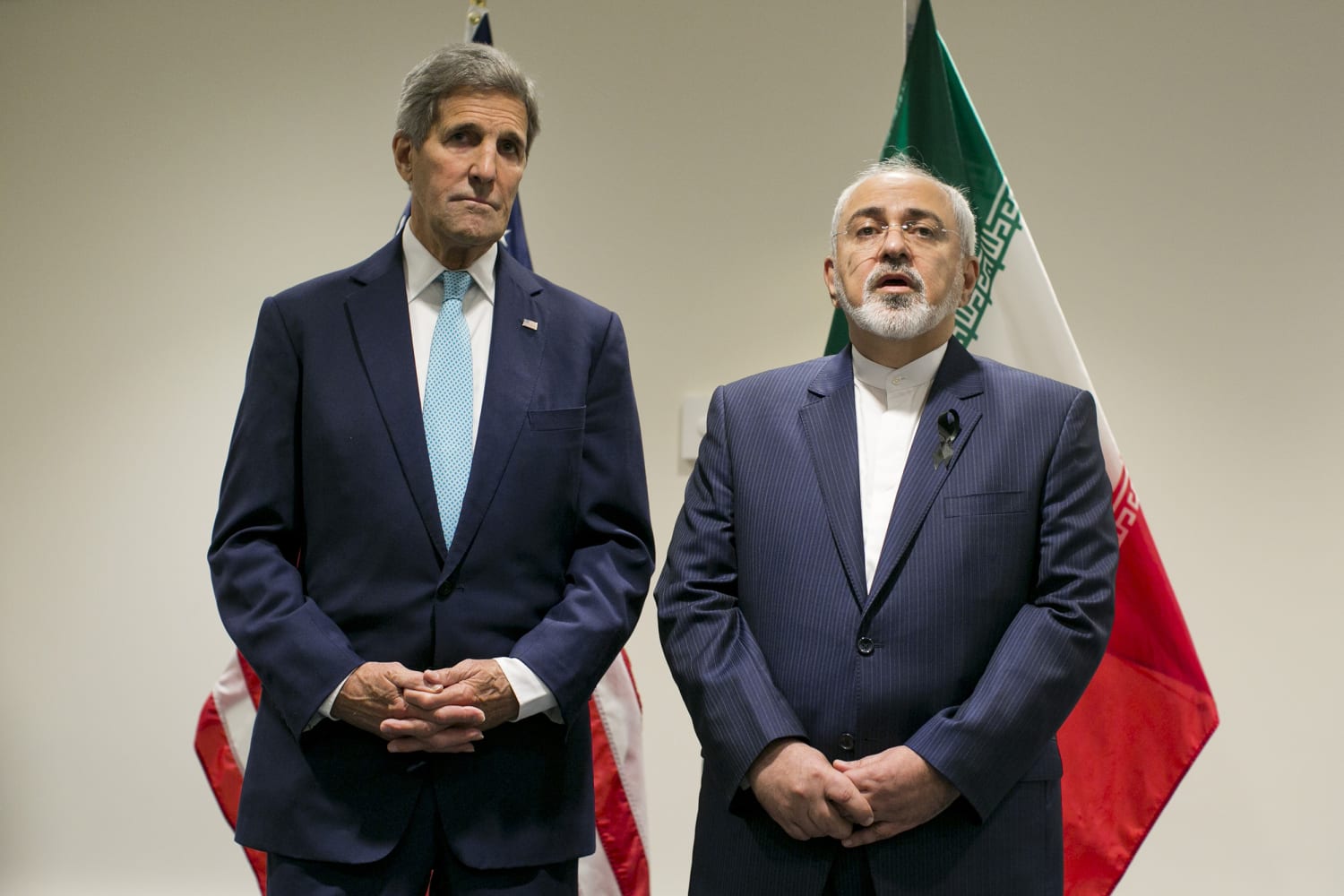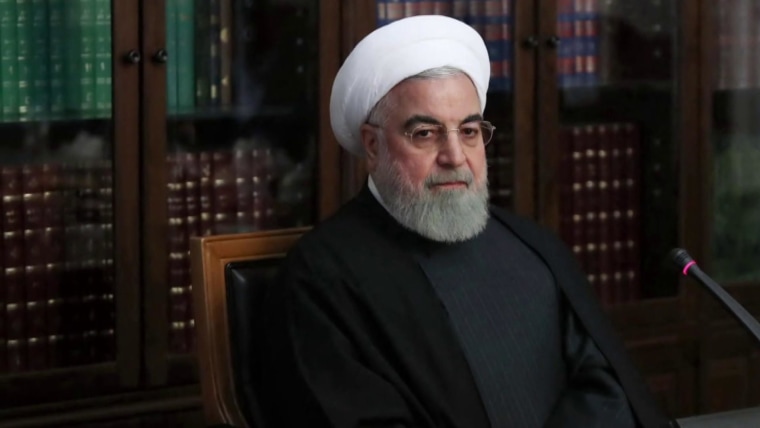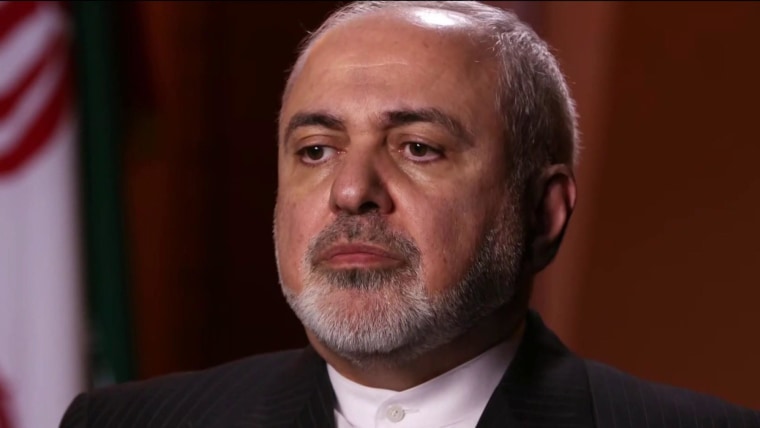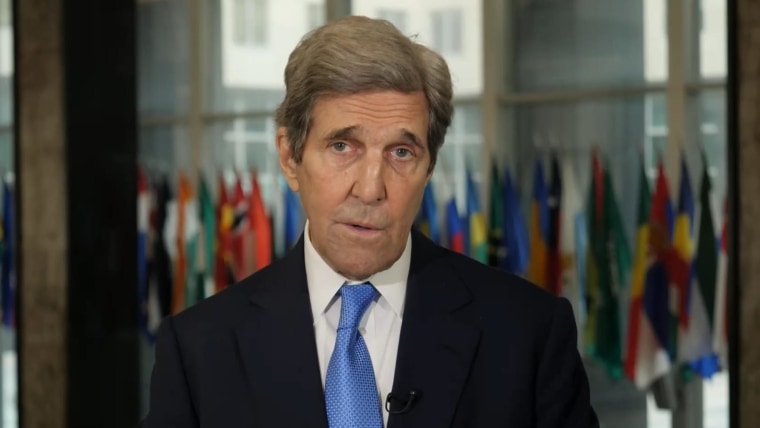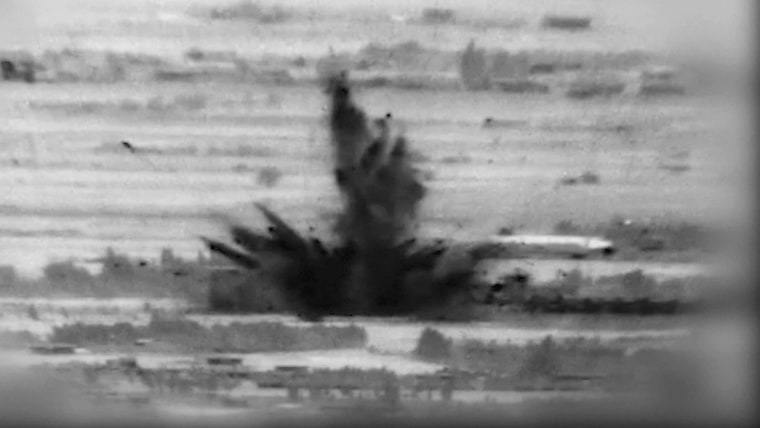WASHINGTON — The bombshell leak of an audio recording with Iran’s foreign minister has exposed bitter internal divisions in Iran, threatening to complicate delicate negotiations underway between Tehran and the United States aimed at reviving the 2015 nuclear agreement.
The leaked interview with Foreign Minister Mohammad Javad Zarif, in which he complains about being undercut by Iran’s hardline Revolutionary Guard Corps, has set off a firestorm and dominated news coverage this week in Iran.
The leak has inflamed a debate raging in Iran over the nuclear deal as rival factions prepare for a presidential election in June. And it’s also had ripple effects in Washington, with Republican opponents of nuclear diplomacy with Iran seizing on Zarif’s account of his conversations with former secretary of state John Kerry.
The intense in-fighting in Iran poses a potential wild card in the nuclear talks now underway in Vienna between Iran and world powers, and it’s not clear if Iranian negotiators will have sufficient political breathing room to hammer out a deal with elections approaching on June 18.
Unlike the previous negotiations that led to the 2015 deal between Iran and world powers, the pre-election machinations mean President Hassan Rouhani and his foreign minister Zarif have far less political space to maneuver this time around, said Ilan Goldenberg, senior fellow at the Center for a New American Security think tank.
“The political competition around the Iranian elections is starting to make it really hard to get this deal done,” said Goldenberg, who served as a senior official handling Middle East policy in the Obama administration. “That’s the thing that could kill these negotiations.”
Rival factions are arguing about how far to compromise with the West, and are also jockeying for who will get the credit if and when the United States agrees to lift the economic sanctions that have badly damaged Iran’s economy, experts said.
The recording, which was supposed to be part of an oral history project to be released years in the future, was recorded in March, according to Iranian media. In it, Zarif said the hardline Revolutionary Guard Corps and the country’s security apparatus effectively run the country and ignore advice from the government and the foreign ministry.
In blunt language, Zarif even dared to criticize the revered Gen. Qassem Soleimani, the commander of the Revolutionary Guard’s Quds Force, who was killed in a U.S. drone strike last year. The regime portrays Soleimani as a heroic figure and martyr, but Zarif accused him of trying to undermine the 2015 nuclear agreement and dragging Iran into the Syrian conflict at Russia’s request.
But Zarif also praised Soleimani in the interview, referring to him as a martyr, recounting how the two had cooperated constructively before the U.S. invasions of Afghanistan and Iraq, had met each other regularly and had become friends.
In the recording, Zarif refers to his interview as confidential and says it will not be released for “years.” He also says some of his comments will never be released.
The head of the office overseeing the oral history project resigned today, Iranian media reported.
Zarif’s comments raised questions about his government’s authority to negotiate with world powers, given the constraints it faces within Iran’s regime. He recounted how his diplomatic efforts often were marginalized by the heavy hand of the Revolutionary Guard, and that he had been “rebuked” recently by the Supreme Leader, Ayatollah Ali Khamenei, for how he had described Iran’s stance going into the nuclear negotiations.
Conservative newspapers condemned Zarif over his comments and critics called for his resignation. Some Iranian newspapers speculated that hardline skeptics of engagement with the West had leaked the recording to undermine the nuclear talks overseen by Zarif, who has been mentioned as a possible presidential candidate.
Iranian President Hassan Rouhani expressed outrage that someone had leaked the confidential interview and said it represented an attempt to undercut the nuclear talks at a crucial stage.
“It was published just when Vienna was on the road to success, to create conflicts in the country,” Rouhani said.
The recording has also played into Washington’s polarized politics over Iran. Republican opponents of the nuclear deal, citing Zarif’s account of conversations with former secretary of state John Kerry, accused Kerry of betraying U.S. interests and America’s ally Israel, demanding he resign from his post as President Joe Biden’s climate envoy.
According to Zarif’s leaked comments, Kerry informed him that Israel had attacked Iranian targets in Syria at least 200 times, something that Zarif claims the Iranian security forces had never bothered to tell him.
“Kerry has to tell me that Israel has attacked you 200 times in Syria?” Zarif said in the recording.
Kerry vehemently denied Zarif’s account.
“I can tell you that this story and these allegations are unequivocally false. This never happened — either when I was Secretary of State or since,” Kerry tweeted.
Kerry was secretary of state from February 2013 to January 2017. Zarif does not say or imply when the exchanges he described with Kerry would have taken place.
“If he did this with the intent of undermining the current president of the United States, at the time President Trump and the members of this body, he needs to resign,” Republican Sen. Dan Sullivan of Alaska said in a speech on the Senate floor.
Israel’s military strikes in Syria are not a secret. Israeli officials, aiming to send a message to Iran, have often leaked information to reporters about strikes on Iranian or Iranian-backed proxies in Syria, and news reports have described Israel’s numerous military attacks inside Syria.
Israeli Prime Minister Benjamin Netanyahu in July 2017 was caught on microphone telling world leaders that Israel had launched attacks on weapons transfers in Syria destined for the Lebanese Hezbollah militia “dozens of times.” Israeli intelligence minister Israel Katz said in September 2018 that the military had carried out more than 200 strikes in Syria over two years.
State Department spokesperson Ned Price did not say whether Kerry had made the reported comments to Zarif, but suggested it would not have represented a breach of secrecy.
“I would just make the broad point that if you go back and look at press reporting from the time, this certainly was not secret,” Price told reporters. “And governments that were involved were speaking to this publicly, on the record.”
Apart from the fallout from the leak, the nuclear negotiations have taken place against the backdrop of confrontations at sea between Iranian Revolutionary Guard ships and U.S. vessels, as well as a cyber attack on a key underground nuclear site in Iran that Tehran blamed on Israel.
The two tense encounters this month in the Persian Gulf saw Iranian speed boats — as well as a larger ship — approach dangerously close to U.S. naval and Coast Guard ships, according to the U.S. Navy’s Fifth Fleet. In the second incident on Monday, a U.S. naval patrol vessel had to fire warning shots to avoid a possible collision with the Iranian boats, which had ignored repeated appeals by radio to pull back.
Earlier this month, Iranian officials said an attack on a key underground uranium enrichment facility in Natanz damaged or destroyed centrifuges, accusing Israel of conducting “nuclear terrorism.” Israeli media reported the sabotage was caused by a cyber attack carried out by the country’s Mossad intelligence service.
The Revolutionary Guard Corps has a track record of carrying out provocative actions when Zarif and other officials have been engaged in diplomatic dialogue with the West. During and after talks that led to the 2015 deal, the hardline Revolutionary Guard arrested and imprisoned Iranian-Americans in 2014 and 2015, and captured American sailors on patrol boats after they strayed into Iranian waters in 2016.
The Revolutionary Guard’s seizure of the U.S. sailors was designed “to make the nuclear deal fail,” Zarif said in the leaked recording.
On Wednesday, Zarif spoke publicly for the first time about the leak, saying his remarks were meant to be an honest, confidential appraisal of how to improve the relationship between the Revolutionary Guard and the foreign ministry.
“I am very sorry how a secret, theoretical discussion about the necessity of increasing cooperation between diplomacy and the field (the Revolutionary Guard) — in order for the next officials to use the valuable experiences of the last eight years — became an internal conflict,” Zarif wrote in a post on Instagram.
His post featured a video of him visiting a memorial in Baghdad for Gen. Soleimani.
The 2015 nuclear agreement between Iran and Britain, France, Germany, China, Russia, the EU and the United States lifted economic sanctions on Tehran in return for strict limits on Iran’s nuclear program. President Donald Trump withdrew the United States from the deal in 2018, reimposed sanctions and introduced an array of new sanctions as part of a “maximum pressure” campaign against Iran.
After the U.S. withdrew, Iran said it was no longer obliged to adhere to the agreement and has flouted restrictions on uranium enrichment and limited access for international inspectors.
The Biden administration has said the United States would be ready to return to the agreement if Iran returned to compliance with the agreement’s limits on its nuclear activity.
Source: | This article originally belongs to Nbcnews.com


